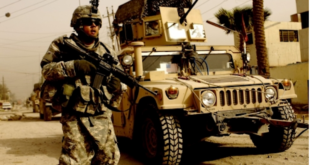KERBALA, Iraq – Thousands of Shi’ites gathered in Kerbala on Wednesday for the biggest religious ceremony in the Iraqi holy city since gunbattles between rival factions forced a mass exodus of pilgrims last August.
Iraqi authorities have launched a major operation to protect pilgrims attending one of the world’s largest religious events, a target in the past for al Qaeda militants, which the U.S. military says is still the biggest threat to peace in Iraq.
Black-clad pilgrims are converging on the city, 110 km (70 miles) south of Baghdad, for Ashura, a 10-day-long event commemorating the death of the Prophet Mohammed’s grandson in battle there 1,300 years ago. The ritual, expected to be attended by several million, climaxes on Saturday.
Pilgrims carried red and black flags, while buildings were draped in black cloth in mourning for Imam Hussein, who was killed in 680.
His death entrenched the schism between Shi’ite and Sunni Muslims, a split that now sharply divides Iraq. Sectarian fighting has killed tens of thousands since February 2006, although the violence has ebbed since June 2007.
“I have come with my husband and two children despite the chilly weather. Attending Ashura is part of our culture and nothing on earth would stop us from showing our grief,” said Ahlam Nima Jasim, 30, from Diwaniya, 120 km to the southeast.
And for the first time in years pilgrims include visitors from the Gulf states of Kuwait, Bahrain and Saudi Arabia, said Saddiq al-Hir, head of Kerbala’s tourism association.
PROTECTIVE MEASURES
A vehicle ban has been imposed in the city, snipers have taken up positions on rooftops, roadblocks set up, and 25,000 soldiers and policemen deployed while Iraqi aircraft keep watch from above for the first time.
Some 4,000 policemen have been deployed on the road between Kerbala and Najaf, another Shi’ite holy city 70 km to the south of Kerbala, a provincial spokesman said.
Many pilgrims from Iraq’s majority Shi’ite community are walking on foot from towns and cities, including the capital, for what is considered one of the holiest events on the Shi’ite religious calendar. In the past many were killed in drive-by shootings.
The Trade Ministry said it had allocated 1,000 trucks normally used to transport sugar, rice and other ration foodstuffs to take pilgrims to Kerbala.
The government announced a vehicle curfew from Thursday night until Saturday evening in Baghdad, the southern provinces and Diyala, a province north of the capital where a major U.S. and Iraqi offensive against al Qaeda militants is under way.
The authorities have already ordered motorbikes off the streets of the capital for fear they could be rigged with explosives and used against pilgrims, who are also prohibited from carrying mobile phones or being accompanied by children.
Security for the event has been tight since suspected al Qaeda suicide bombers and mortar attacks killed 171 people during Ashura in Kerbala and in Baghdad in 2004.
This year, it is even tighter after last August’s clashes at a religious festival when more than 50 people were killed in the violence between gunmen loyal to fiery cleric Moqtada al-Sadr and the Supreme Islamic Iraqi Council, the most powerful Shi’ite party in Iraq.
The fighting forced an evacuation of hundreds of thousands of pilgrims and raised questions about the Iraqi security forces’ ability to protect such events.
 Eurasia Press & News
Eurasia Press & News



